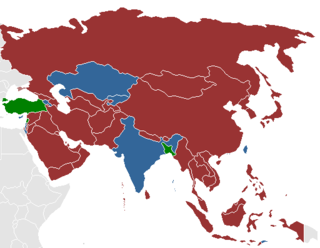
West Bengal is a state in the eastern portion of India. It is situated along the Bay of Bengal, along with a population of over 91 million inhabitants within an area of 88,752 km2 (34,267 sq mi) as of 2011. The population estimate as of 2023 is 102,552,787. West Bengal is the fourth-most populous and thirteenth-largest state by area in India, as well as the eighth-most populous country subdivision of the world. As a part of the Bengal region of the Indian subcontinent, it borders Bangladesh in the east, and Nepal and Bhutan in the north. It also borders the Indian states of Jharkhand, Odisha, Bihar, Sikkim and Assam. The state capital is Kolkata, the third-largest metropolis, and seventh largest city by population in India. West Bengal includes the Darjeeling Himalayan hill region, the Ganges delta, the Rarh region, the coastal Sundarbans and the Bay of Bengal. The state's main ethnic group are the Bengalis, with the Bengali Hindus forming the demographic majority.
FreshMinistries is a non-profit organization based in Jacksonville, Florida, whose goal is to eradicate poverty, improve race relations and build stronger communities. The group focuses on economic development, job training and health initiatives in core-city Jacksonville. FreshMinistries is also engaged in international projects.

Sex trafficking is human trafficking for the purpose of sexual exploitation. It has been called a form of modern slavery because of the way victims are forced into sexual acts non-consensually, in a form of sexual slavery. Perpetrators of the crime are called sex traffickers or pimps—people who manipulate victims to engage in various forms of commercial sex with paying customers. Sex traffickers use force, fraud, and coercion as they recruit, transport, and provide their victims as prostitutes. Sometimes victims are brought into a situation of dependency on their trafficker(s), financially or emotionally. Every aspect of sex trafficking is considered a crime, from acquisition to transportation and exploitation of victims. This includes any sexual exploitation of adults or minors, including child sex tourism (CST) and domestic minor sex trafficking (DMST).
Sonagachi is a neighbourhood in Kolkata, India, located in North Kolkata near the intersection of Jatindra Mohan Avenue with Beadon Street and Sovabazar, about one kilometer north of the Marble Palace area. Sonagachi is among the largest red-light districts in Asia and the world with several hundred multi-storey brothels residing more than 16,000 commercial sex workers.

Prostitution is legal in India, but a number of related activities including soliciting, kerb crawling, owning or managing a brothel, prostitution in a hotel, child prostitution, pimping and pandering are illegal. There are, however, many brothels illegally operating in Indian cities including Mumbai, Delhi, Kolkata, Pune, and Nagpur, among others. UNAIDS estimate there were 657,829 prostitutes in the country as of 2016. Other unofficial estimates have calculated India has roughly 3 million prostitutes. India is widely regarded as having one of the world's largest commercial sex industry. It has emerged as a global hub of sex tourism, attracting sex tourists from wealthy countries. The sex industry in India is a multi-billion dollar one, and one of the fastest growing.
Sanlaap is an Indian feminist non-governmental organisation, established by Indrani Sinha in 1987 in Calcutta. Based in Calcutta, the group aims to protect the human rights of women and girls. Sanlaap is a developmental organisation that works towards correction of social imbalances which present themselves as gender injustice and violence against women and children. The primary work is focused against trafficking of women and children for commercial sexual exploitation, sexual abuse and forced prostitution. As part of its work, the group starts shops to train girls to make a living and foster their independence.
The All Bengal Women's Union was started in the 1932, when a group of women in West Bengal formed a cadre of like-minded women to help their helpless, exploited and victimized fellow women.

Prajwala is a non-governmental organization based in Hyderabad, India, devoted exclusively to eradicating prostitution and sex trafficking. Founded in 1996 by Ms. Sunitha Krishnan and Brother Jose Vetticatil, the organization actively works in the areas of prevention, rescue, rehabilitation, re-integration, and advocacy to combat trafficking in every dimension and restore dignity to victims of commercial sexual exploitation.
Prostitution in Kolkata is present in different forms and Kolkata's sex industry is one of the largest in Asia. Prostitution may be brothel-based or non-brothel based as in the case of call girls. India is regarded as having one of the largest commercial sex trades globally. Kolkata has many red-light districts, out of which Sonagachi is the largest red-light district in Asia with more than 50,000 commercial sex workers.
The Ministry of Labour & Employment is one of the oldest and most important Ministries of the Government of India. This is an India's federal ministry which is responsible for enforcement of labour laws in general and legislations related to a worker's social security. The Ministry aims to create a healthy work environment for higher production and productivity and to develop and coordinate vocational skill training and employment. However, Skill Development responsibilities, such as Industrial Training and Apprenticeship responsibilities were transferred to the Ministry of Skill Development and Entrepreneurship from 9 November 2014. The Ministry launched the National Career Service portal on 20 July 2015 to help bridge the gap between job providers and job seekers.
Ruchira Gupta is a journalist and activist. She is the founder of Apne Aap, a non-governmental organisation that works for women's rights and the eradication of sex trafficking.
Shared Hope International (SHI) is a non-profit, non-governmental, Christian organization that exists to prevent sex trafficking, and restore and bring justice to women and children who have been victimized through sex trafficking. SHI is part of a worldwide effort to prevent and eradicate sex trafficking and slavery. Shared Hope operates programs in the United States, India, Nepal, and Jamaica. Shared Hope leads awareness and training, prevention strategies, restorative care, research, and policy initiatives to mobilize a national network of protection for victims.

India has a very high volume of child trafficking. As many as one child disappears every eight minutes, according to the National Crime Records Bureau. In some cases, children are taken from their homes to be bought and sold in the market. In other cases, children are tricked into the hands of traffickers by being presented an opportunity for a job, when in reality, upon arrival they become enslaved. In India, there are many children trafficked for various reasons such as labor, begging, and sexual exploitation. Because of the nature of this crime, it is hard to track; due to the poor enforcement of laws, it is difficult to prevent. As such, there are only vague estimates of figures regarding the issue. India is a prime area for child trafficking to occur, as many of those trafficked are from, travel through or destined to go to India. Though most of the trafficking occurs within the country, there is also a significant number of children trafficked from Nepal and Bangladesh. There are many different causes that lead to child trafficking, with the primary reasons being poverty, weak law enforcement, and a lack of good quality public education. The traffickers that take advantage of children can be from another area in India, or could even know the child personally. Children who return home after being trafficked often face shame in their communities, rather than being welcomed home.
Human trafficking in Nepal is a growing criminal industry affecting multiple other countries beyond Nepal, primarily across Asia and the Middle East. Nepal is mainly a source country for men, women and children subjected to the forced labor and sex trafficking. U.S. State Department's Office to Monitor and Combat Trafficking in Persons placed the country in "Tier 2" in 2017.
The textile industry in India, traditionally after agriculture, is the only industry in the country that has generated large-scale employment for both skilled and unskilled labour. The textile industry continues to be the second-largest employment generating sector in India. It offers direct employment to over 35 million people in the country. India is the world's second largest exporter of textiles and clothing, and in the fiscal year 2022, the exports stood at US$ 44.4 billion. According to the Ministry of Textiles, the share of textiles in total exports during April–July 2010 was 11.04%. During 2009–2010, the Indian textile industry was pegged at US$55 billion, 64% of which services domestic demand. In 2010, there were 2,500 textile weaving factories and 4,135 textile finishing factories in all of India. According to AT Kearney’s ‘Retail Apparel Index’, India was ranked as the fourth most promising market for apparel retailers in 2009.

Bangladesh–Canada relations are the foreign relations between Bangladesh and Canada established 1972. Canada is represented through its High Commission in Dhaka and Bangladesh is through its High Commission in Ottawa. Both countries are members of the Commonwealth of Nations and the United Nations. Bangladesh currently receives ~$110 million from Canadian official development assistance per year as of January 2014. It is estimated that around 36,000 (2012) Bangladeshi people live in Canada, primarily in cities like Toronto, Vancouver, Montreal, Calgary, Edmonton, and Ottawa.
Samabhavana Society is an ISO 9001:2008 certified non-profit organisation in India that serves the society primarily in the areas of Child Protection, Gender, Sexuality & Human rights across India. The NGO is actively involved in mapping of NGOs with good track record and implementation of CSR projects in India.

Missing Link Trust is a nonprofit organization that uses art and educational campaigns to raise awareness and prevent child sex trafficking. Their work includes public sculpture installations, stencil campaigns, the interactive video game Missing: Game for a Cause, and the interactive online comic Web of Deceit - A missing and trafficking casefile. The organization was awarded the 2021 Stop Slavery Campaigns Award from the Thomson Reuters Foundation.
The/Nudge Institute, formerly The/Nudge Foundation, is an Indian non-profit action institute established in 2015 with the aim to contribute to "a poverty-free India."

Indian Chamber of Commerce is a non-governmental trade association and advocacy group having its headquarter situated in Calcutta India. It is one of the oldest trade association in the country and it was founded in year 1925.








